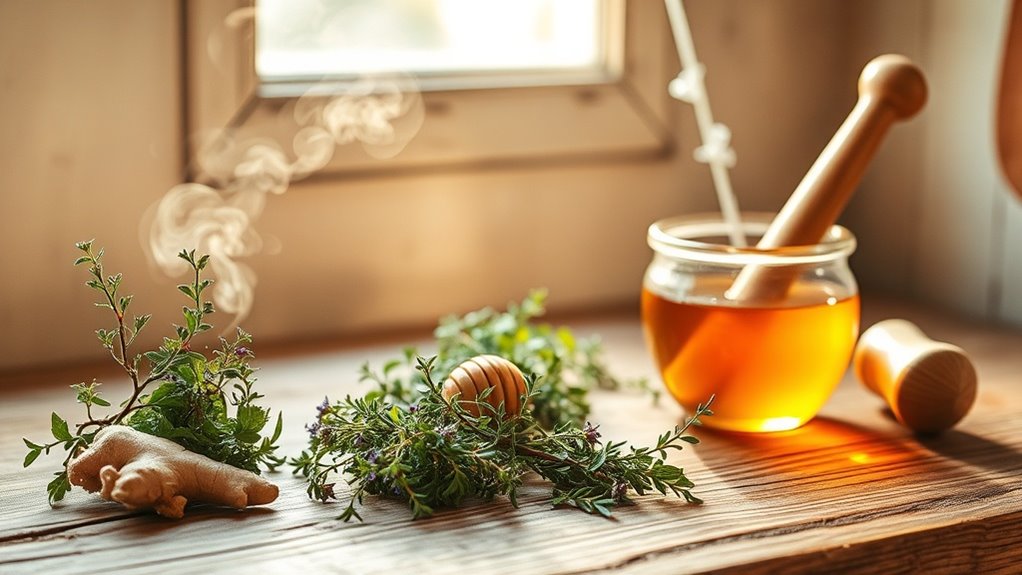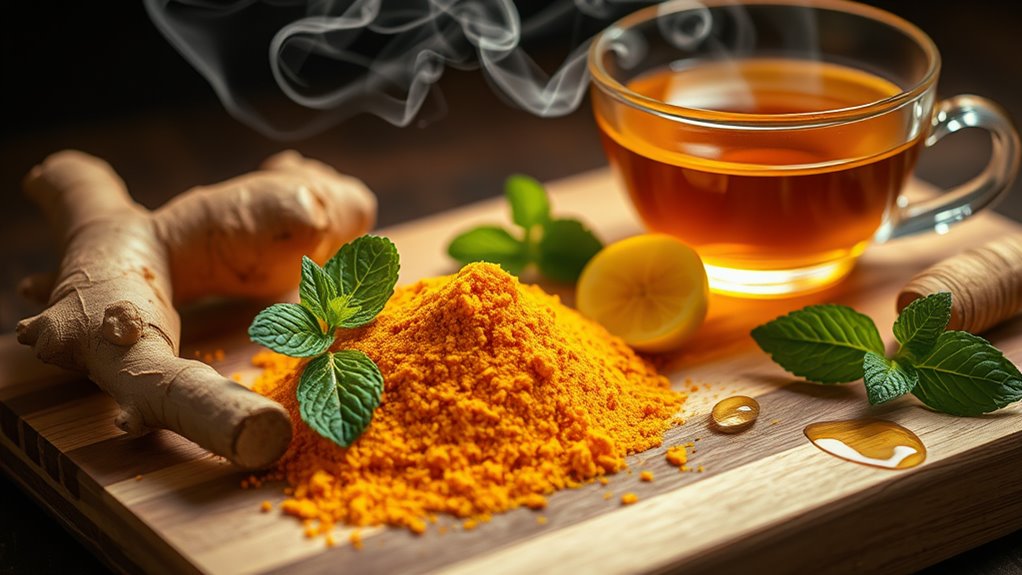Silence That Stubborn Cough – Herbal Syrup Recipe That Works
If you want to silence that stubborn cough, try making a homemade herbal syrup. Combine raw honey, fresh ginger, lemon juice, and thyme leaves for a soothing and effective remedy. Honey has antibacterial properties, while ginger reduces inflammation and throat irritation. Mix these ingredients in warm water to enhance absorption, and store your syrup in a cool, dark place. There are more details and tips to help you maximize the benefits.
Understanding Coughs: Causes and Remedies
Coughing can often feel like a nuisance, but understanding its causes can help you find the right remedies.
Environmental irritants, allergies, or infections may trigger it. To soothe your cough, consider making a homemade cough syrup natural. Ingredients like honey, lemon, and ginger can provide relief by soothing your throat and reducing irritation. Creating a syrup with powerful plant extracts enhances its effectiveness for cough relief.
Knowing the cause lets you choose effective solutions.
Benefits of Herbal Ingredients
Exploring natural remedies for cough relief leads to the benefits of herbal ingredients. These ingredients often possess anti-inflammatory, antibacterial, and soothing properties, which help alleviate throat irritation and reduce cough frequency. You’ll find that herbal options typically have fewer side effects compared to over-the-counter medications, making them gentler on your system. Plus, they offer a holistic approach to health and wellness. Incorporating immune-boosting properties from elderberry can significantly enhance your body’s defenses against cold symptoms.
Key Ingredients for the Syrup
When making your herbal syrup for cough, choosing the right primary herbs is essential for effectiveness.
You’ll want to consider various sweetening agents that can enhance flavor while helping soothe your throat. Herbal ingredients offer natural relief for coughs and soothe irritated throats.
In this section, we’ll explore which herbs to use and the best ways to sweeten your syrup.
Primary Herbs to Use
To craft an effective herbal syrup for cough relief, you’ll want to focus on a few key herbs that have long been revered for their soothing properties.
Consider using thyme, known for its antimicrobial benefits, and demulcent marshmallow root to coat your throat.
Licorice root adds sweetness and helps reduce inflammation, while slippery elm provides additional soothing effects for persistent coughing.
Sweetening Agents Explained
While crafting your herbal syrup, it’s essential to choose the right sweetening agents, as they not only enhance flavor but also contribute to the syrup’s therapeutic properties. Here’s a quick overview of popular sweeteners you can use:
| Sweetening Agent | Benefits |
|---|---|
| Honey | Antimicrobial, soothing |
| Maple Syrup | Rich in antioxidants |
| Agave Nectar | Low glycemic index |
| Brown Sugar | Adds depth, retains moisture |
| Stevia | Natural, zero calories |
Step-by-Step Recipe for Herbal Cough Syrup
Now that you know the key ingredients for your herbal cough syrup, it’s time to put those components to use.
In this section, you’ll walk through a straightforward preparation process, ensuring you create an effective remedy at home. Hydration is crucial for alleviating cough symptoms, so make sure to incorporate plenty of water in your daily routine.
Let’s get started on this simple step-by-step recipe!
Essential Ingredients List
Crafting an effective herbal cough syrup requires just a handful of essential ingredients that work together to soothe your throat and relieve cough symptoms.
You’ll need raw honey for sweetness and its antibacterial properties, ginger for its anti-inflammatory qualities, lemon juice for vitamin C, and cinnamon for flavor and additional health benefits.
These ingredients create a powerful remedy that can calm your persistent cough.
Preparation Process Explained
To make your herbal cough syrup, you’ll first want to gather all your ingredients and tools, ensuring you have everything at hand for a smooth preparation process. Here’s a quick overview:
| Ingredient | Quantity |
|---|---|
| Honey | 1 cup |
| Fresh ginger | 2 tablespoons |
| Lemon juice | ¼ cup |
| Thyme leaves | 2 tablespoons |
| Water | 2 cups |
With everything ready, you’re set to start brewing!
Tips for Using Herbal Cough Syrup Effectively
Using herbal cough syrup can be an effective way to soothe your throat and reduce coughing, but it’s important to use it correctly for the best results.
Here are three tips:
-
Follow the recommended dosage for your age and weight.
-
Take the syrup with warm water to enhance absorption.
-
Store it in a cool, dark place to maintain potency.
Precautions and Considerations
While herbal cough syrup can provide relief, it’s important to be aware of certain precautions and considerations before using it. Always consult with a healthcare professional, especially if you’re pregnant, nursing, or on medication. Watch for allergic reactions, and remember that herbal remedies may interact with other treatments. Additionally, certain herbs like St. Johns Wort may affect mood when combined with other medications, so it’s vital to ensure safety before use.
| Precaution | Recommendation | Notes |
|---|---|---|
| Consult healthcare | Before starting any new remedy | Essential for safety |
| Check for allergies | Test a small amount | Avoid adverse reactions |
| Monitor symptoms | Track progress consistently | Adjust dosage if needed |
Additional Natural Remedies for Cough Relief
When you’re looking for effective ways to relieve a cough, several natural remedies can complement herbal syrups and ease your symptoms.
Consider trying these:
-
Honey: This soothing agent coats your throat, reducing irritation and offering natural humectant properties that help keep your throat hydrated.
-
Ginger Tea: Known for its anti-inflammatory properties, it can help alleviate discomfort.
-
Steam Inhalation: Breathing in steam can loosen mucus, making it easier to cough up.
Give these a shot!





